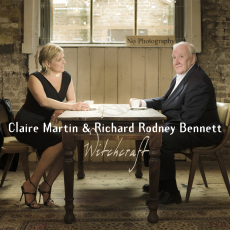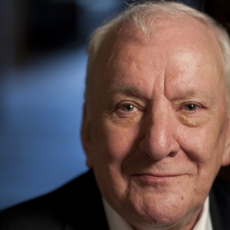Claire Martin & Richard Rodney Bennett - Live Review - The Wall Street Journal
Irving Berlin was obsessed with simplicity; playwright Anita Loos famously described how she witnessed him endlessly rewriting and rethinking a song to make it as simple and direct as possible. He would have loved the British team of singer Claire Martin and pianist-occasional vocalist Richard Rodney Bennett, who are doing a program of his songs at the Oak Room. In the case of this duo, voice (usually one at a time) and piano are all you need; bass, drums or horns would only be intrusive. The open format exposes both the performers and the songs-there's no place to hide, no additional instruments to cover up any shortcomings, and it wouldn't work if Berlin's songs weren't so brilliantly constructed to begin with. The result is a kind of perfection that's anything but minimalist. Further, Mr. Bennett in particular shows that even Berlin's least known works, like "Lonely Heart" (from "Thousands Cheer"), are as expertly constructed as the hits.

Alan Nahigian
Berlin is often listed as a member of the famous Algonquin Round Table, those celebrated wits of the Jazz Age who convened in the very same Oak Room. Yet I don't imagine the songwriter spent a lot time guzzling cocktails and trading bon mots; he was much too busy writing songs. As Mr. Bennett points out in the show, the goal Berlin set for himself was to compose one new song every day. He may not have reached it, but by the time he was finished he had written what is estimated at about 1,500 songs.
In another famous anecdote, Berlin is having a drink with his fellow songwriter Cole Porter, and one of them asks, "Can you imagine that sometimes it takes two guys to write a song?" In being able to write both lyrics and music so brilliantly, Berlin was a kind of one-man duet. Throughout the opening-night set at the Algonquin, Ms. Martin and Mr. Bennett (who have just released "Witchcraft," a new album on which they give comparable treatment to the marvelous music of Cy Coleman), showed the benefits of the duo concept.
It isn't just the tension between voice and piano, but the amazing ways in which Ms. Martin uses her deep, sultry contralto to convey contrast. She has a sense of dynamics inspired by Tony Bennett (who I've seen at her performances), and knows precisely when to sound light and when to sound heavy, when to sound sultry and when to sound breezy. Rhythmically, she and Mr. Bennett (who, in his other career, is a Knighted composer of film scores and classical music) are even able to articulate the subtle difference between syncopation (as on the earlier songs like "When the Midnight Choo Choo Leaves for Alabam") and swing (as on the later songs). She sings "Love, You Didn't Do Right By Me" like a semi-comic air of self-deprecation rather than a typical torch song, and with a very dramatic pause after the first word. At one point on "Steppin' Out With My Baby" (one of many songs the pair played from "Easter Parade") Mr. Bennett accompanied her with just his left hand, which conveyed the feeling of a voice-and-bass duet.
Another duality is the contrast between the classics, like "Blue Skies" (which Ms. Martin sings with a scat chorus, à la Ella Fitzgerald's Songbook version), and the obscurities, like Ms. Martin's "Fools Fall in Love" (from Lee Wiley's Berlin album) and Mr. Bennett's "He Ain't Got Rhythm," which might be viewed as a caustic, glass-half-empty answer to the Gershwin brothers. The set also alternates between full songs and well-constructed medleys, like a mash-up of songs about giving in to temptation, "Get Thee Behind Me, Satan" and "I Got Lost in His Arms." There's also a medley of "Isn't This a Lovely Day?" and "It's a Lovely Day Today." I was wondering why they'd omitted "It's a Lovely Day Tomorrow" but then I realized that everything has its limits.


